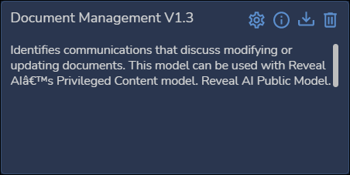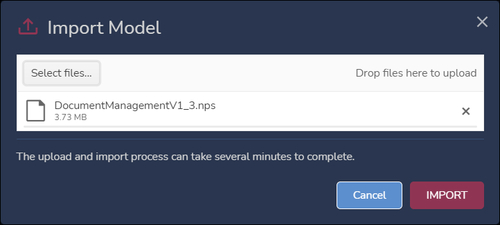This is a brief overview of the models available within Reveal's AI Model Library.
Reveal comes with a growing number of pre-built AI models that can be applied out of the box to jumpstart the AI Model (Classifier) training process. These AI models can be applied in many common litigation and investigation scenarios. AI models may be exported from and imported to the library.
.png?quality=high&width=688&height=459&name=34%20-%2001%20-%20AI%20Model%20Library%20(Cards%20View).png)
The AI Model cards may be filtered (Find Models at upper right) or sorted by Name, Date Published or Author in Ascending or Descending order as specified using the buttons to the right of the sort selection. As of the February 2024 release, the AI Model Library may be toggled into List View, where you may sort any of the three columns in ascending or descending order by clicking its heading.
.png?quality=high&width=688&height=447&name=34%20-%2001a%20-%20AI%20Model%20Library%20(List%20View).png)
AI Model Library - Current Contents
The following AI models are currently available in the AI Model Library, which may be accessed using the Model Library navigation button.
|
Name |
Description |
|
Privileged Content |
Identifies documents that contain privileged content. This includes conversations involving requests for legal advice, legal advice itself, and preparing documents for depositions. |
|
Asking for Advice |
Identifies communications in which the participants solicit or share advice. When used with other models, this model adds the context of advice with other behaviors of interest, like privileged content or career goals. |
|
Advertisements & Promotions |
Identifies communications that can include advertisements, newsletters, and other forms of promotional material. This model may be used to filter out irrelevant documents to reduce noise within the data set. |
|
Gifts & Entertainment Kickbacks |
Identifies communications that discuss gifts and forms of entertainment that may have a monetary value associated with it, i.e. sporting events, theater performances, or concerts. This model may be used in connection with domain filters to detect instances of bribery & kickbacks. |
|
Document Management |
Identifies communications that discuss modifying or updating documents. This model can be used with Reveal AI’s Privileged Content model. |
|
Contracts |
Identifies contractual agreements in the form of loose files, attached documents, or cut-and-pasted excerpts of contracts embedded in emails. |
|
Sexually Explicit Comments |
Identifies communications that include descriptive language related to sexual acts or inappropriate behavior. These communications may be general in nature or targeted at a specific person or situation. |
|
Comments on Appearance |
Identifies communications related to a person's attire or physical attributes. These communications may have positive or negative connotations, and may exist in the form of jokes, compliments, or advice. |
|
Employment & Career Advancement |
Identifies communications about promotions, job opportunities, and workplace performance. |
|
Bullying & Toxic Behavior |
Identifies aggressive language with the intent to cause someone mental harm or shame. |
|
Hate & Discrimination |
Identifies communications of animosity or disparagement toward an individual or a group due to their race, color, national origin, sex, disability, religion, or sexual orientation. |
|
Insulting & Vulgar Behavior |
Identifies communication having offensive language. |
|
Threatening Behavior |
Identifies communications with offensive language and strong intent to inflict physical or mental harm to someone else. |
|
Pricing & Fees |
Identifies communications about pricing or fees for a good or service with colleagues, clients, or outside vendors. |
|
Out of Office |
Identifies automatically generated out of office notifications. |
|
Sports Conversations |
Identifies communications discussing news about various professional sports. |
|
Personal & Family Events |
Identifies communications related to family and personal plans outside of work. |
|
Work Events |
Identifies communications related to social activities with work colleagues, such as team outings, dinner plans, and happy hours. |
|
Business Meetings |
Identifies communications with mentions of business meetings, such as business dinners, business office visits, and mentions that imply that the participants met or will meet. This includes meetings on collaboration platforms. |
|
Trading Conversations |
Identifies communications related to trading, stock market, stock prices, and investments. |
AI Model Library Cards and Export
Each model in the library is presented as a card containing a brief description, information about the model’s creation, and the ability to export or delete the model.

A look at the card shows the title and description, and four tools:
- Model Settings – Enables the editing of the model name and description.
- Information – A bubble displays when the model was created, who published it, and number of current references to classifiers.
- Export – Allows the model to be downloaded as an .nps file. The exported file will retain the name of the model without the spaces or special characters.

- Delete – Delete the model from the library.
AI Model Import
You may add a model to the library to extend its utility to the current project.

- Click Import Model at the top of the Model Library screen.
- Select or drag and drop an NPS file into the Import Model
- Click Import.
- A green banner will appear at the top of the screen saying that the selected model has been imported successfully when complete. It may now be used in the project as detailed in How to Apply AI Model from AI Model Library.
Last Updated 2/16/2024
